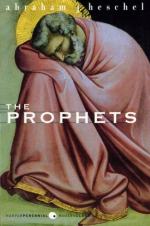
|
| Name: _________________________ | Period: ___________________ |
This test consists of 15 multiple choice questions and 5 short answer questions.
Multiple Choice Questions
1. According to Heschel, how did God show himself to prophets?
(a) In totality.
(b) In variables.
(c) In vague notions.
(d) In absolutes.
2. What does Heschel say will change God's judgment about destruction?
(a) A change in man's heart and actions.
(b) A new prophet's heartfelt request.
(c) Nothing.
(d) A change in history.
3. Heschel says that prophets have a duty to what?
(a) To their families.
(b) To their countrymen.
(c) To their time and place.
(d) To their religion.
4. What does Heschel see as the point when freedom is lost?
(a) When God hardens a person's heart.
(b) When God takes it away.
(c) When a person dies.
(d) When a person misuses it.
5. Prophets rebuked the inhabitants of cities for things that others would have called what?
(a) Wondrous.
(b) Unjust.
(c) Sinful.
(d) Acceptable.
6. Who was Hezekiah?
(a) A shepherd.
(b) A prophet.
(c) A brother of Isaiah.
(d) A king.
7. Who died the year that Isaiah was called by God?
(a) The prophet Amos.
(b) His son.
(c) The king.
(d) His wife.
8. In Jeremiah, God states that he will have to destroy what he has built. What was he referring to?
(a) The temple in Jerusalem.
(b) The covenant.
(c) The land.
(d) His people.
9. Jeremiah says that even though people are punished they don't seem to what?
(a) Understand.
(b) Be penitent.
(c) Have remorse.
(d) Care.
10. Who was Mesha?
(a) King of the Israelites.
(b) King of the Moabites.
(c) A herdsman.
(d) A prophet.
11. According to Heschel, the prophets had no ideas about God, but had what?
(a) An obedience.
(b) A relationship.
(c) An experience of him.
(d) An understanding.
12. How does Heschel describe freedom?
(a) As a right of man.
(b) As a gift from man to God.
(c) As a gift from God to man.
(d) As a benefit for humans.
13. According to Heschel, the land at the time of the prophets had judges and laws but they were both without what?
(a) Love.
(b) Obedience.
(c) Righteousness.
(d) Honor.
14. What does Heschel say is the basis for the relationship of God and man?
(a) Religion.
(b) Divine pathos.
(c) Love.
(d) Obedience.
15. Heschel states that it is a mistake to think that what happens on earth reflects what?
(a) What is happening in heaven.
(b) What has happened in the past on earth.
(c) What is going to happen in the future on earth.
(d) What has happened in the past in heaven.
Short Answer Questions
1. What social ill did Hosea primarily speak out against?
2. What does Habakkuk ask God directly?
3. What happened to prophets when God called them to do his work?
4. What was Micah's message?
5. What changed with Second Isaiah?
|
This section contains 450 words (approx. 2 pages at 300 words per page) |

|




